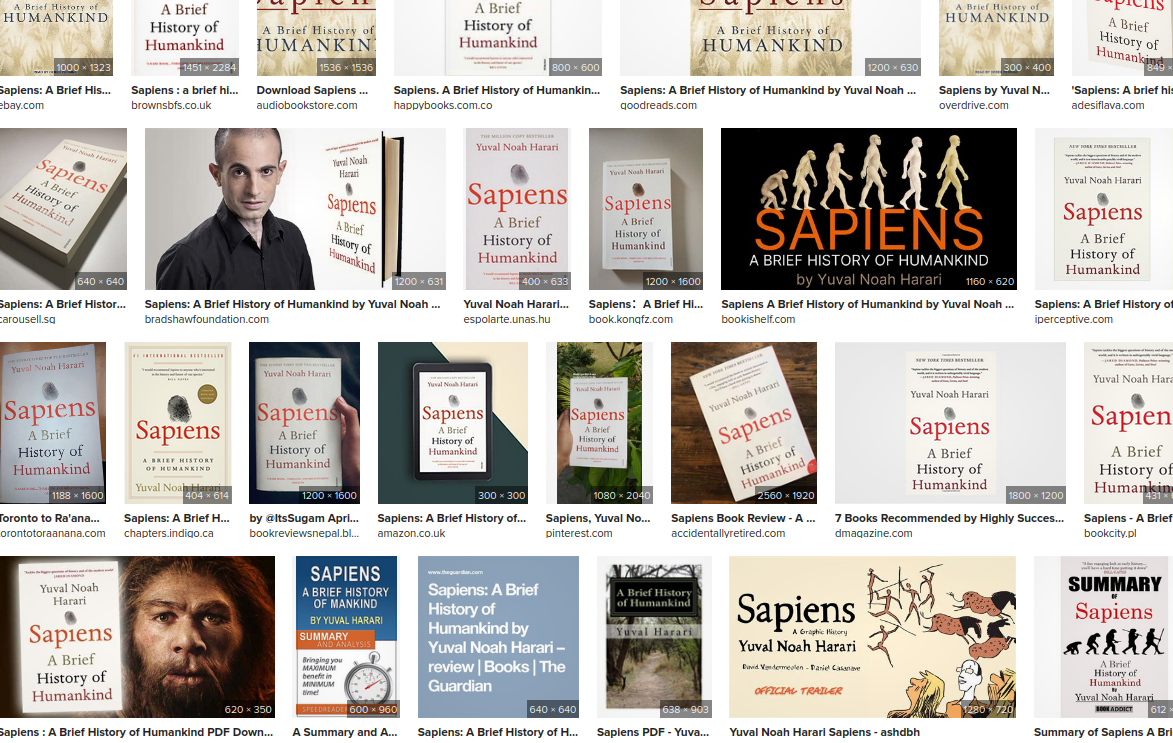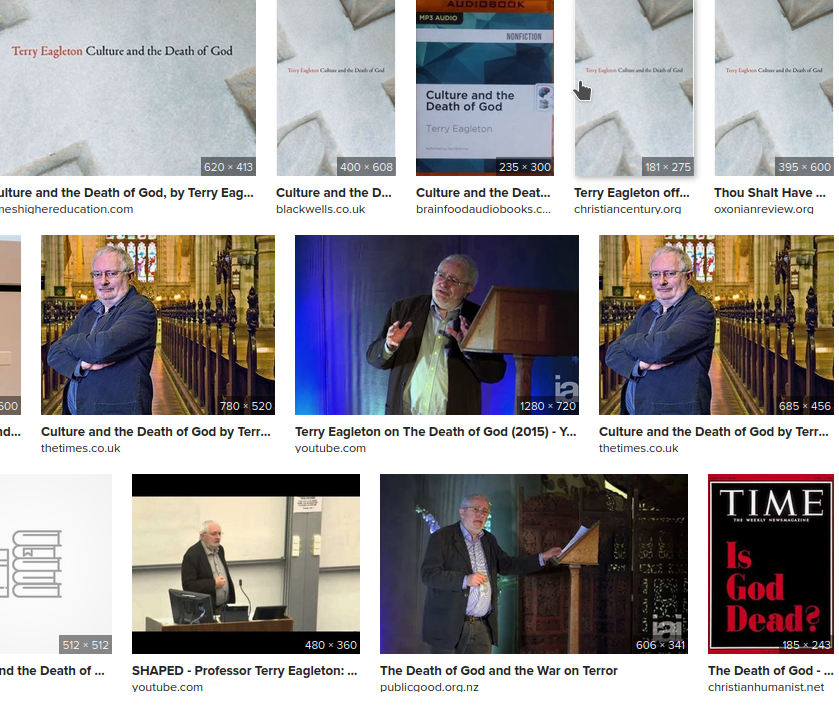There is no narrative, but, the show must go…. —on

Over a decade after it came out I finally have had a gander at Yuval Noah Harari’s Sapiens: A Brief History of Mankind (2011).
It’s a fine introduction. I tend to agree with what bits I read about empire. It tells a good story. What’s wrong with that…?
Apparently all that co-operation we do, Harari says (from that wikipedia link) (and that our world is built from I say) is because of our capacity for fiction. But since when do capacities do anything?

Other writers think it is the capacity of imagination that makes us human and thus worldly.
Thing is, I can imagine a species, alien or not, that imagines very well and fictionalises away into all sorts of self-focussed fantasies, without co-operation at all. Some would call them narcissists, or psychopaths. And others might call them baboon societies. A benign form might be just schizoid.
The recent arguments that empathy is what literature works and strengthens is more helpful here than just “imagination” AMAZING or “fiction” AMAZING or “christ’s sacrifice” TRUE (as youngsters say today, which just means I hear you boomer).
Empathy is more helpful because the world is about what should be good for others. No empathy, no morality. It’s a type of emotional formal logic.
Should does more good than the usual normative box it is put in when the “objective reality” under study, or the social survey in design, is interfered with by bias/POV etc, but more of that later. When we should we try to good the world. It is a fraught thing to do however.
Sure, empathy, that takes imagination. Sure, the future is a fiction, but you see where I’m going with this, surely?? You predicative text machine you…
—my “worldbuilding” usage (as replacement or adjunct for “moral urge”) is directly linked or lifted from the fictional oeuvre/s of high fantasy and science fiction, and I see deficits with the simplex forms of “fiction” and “imagination”. They are partly right, but it is not the capacity for these abilities that does the work, it is the work that does the work.
At this point I wonder perhaps, should I go whole hog and neologise some worlding faculty called “empathocracising”, in contrast with psychopathocracy. I am not yet sure but I am imagining that fiction now, but should I bring it into the world, (sshhh too late).

I am still reading Culture and the death of god by Terry Eagleton, slowly but enjoyablely. I recommended it more than Harari’s book. He argues culture has become what god, religion, art, were in the past. Contested terrain for contesting a contested reality. Homeric is as homeric does.
Anyway, I reckon, not Terry as far as I have read, culture warriors project their own needs and behaviours onto other humans they do not like, or at least onto other humans who do not listen their orders. One can hear this in the phrase “they want to control the narrative”, this betrays a possible projection of a totalitarian narcissistic want to control the world in glory of their self-image. Thus the requirement to find conspiracies are ubiquitous, for truth can only get in the way of that narcissistic me-topian fantasy. Pretend others are in a conspiracy and you are then entitled to form a conspiracy of your own. For culture warriors, fiction and imagination and worlding are not empathic creations that make special to nurture the humans to come. No, they are paranoid tool sets. They create self-fulfilling paranoia.
If you are simply living your life and do not acquiesce to the scaredy-cat warriors’ views then you are seen to be seeking to control the narrative, even if you just ignore rather actively reject the psychopath. The lack of evidence of obedience shows you are choosing choice, thus, besides being classed as unclean, you are a heretic, a danger to the world, i.e. themselves. Their paranoia is confirmed.
It is assumed in this narrative control theory that there is a beginning, a middle and an end where they win or lose. (See, look, see, they have both capacity for fiction and imagination.)
But narratives occur in the world, they are not the world in toto. A psychopath cannot tell the difference, just as their narcissism cannot tell the difference between their self and the world, they are one leader, one people, one culture, one religion, one god, one narrative, one imagination, one fiction, one illusion because they are special, and you are not because you are not them, obviously.
All deeply brittle, easily threatened… —by everything.
Including you. For noticing you as anything else but a threat, even when you are just being you, would require empathy.
Empathy requires surviving the reality principle as one becomes a child. This is unavailable to psychopaths and many grandiose narcissists, and irretrievable broken in covert narcissists, who could be perhaps repaired if they lived longer, many centuries or millenia longer, than is currently possible.
The social reality of the world of other people/s requires empathy. People with empathy build the world, those who lack it seek to control the narrative and make it one with themselves. [I did it my way].
Further, any objective reality is a later projection of that real world modelling of people not oneself.
The discovery of any objective reality is a intensification of the real world of other people. I’ve said before logic is a hindsight because of this, but it also shows that truth, capitalised or not, is always a product of 'intersubjective processes', even if what is revealed then shows those empathic souls to be objective illusions. This is why culture warriors talk about alternative truths. This is a kludge they use deftly, to not directly point out, too obviously, that they are the one truth, one world, the one leader, one people, one culture, one religion, one god, one narrative, one imagination, one fiction.
So many 1s.
Empathic souls do not care if they are illusions because they build the world anyways, and not necessarily seek to control what others have made. There is no god, life goes on. Without this soft touch none of us would be here in the world.
Then agnosticism need not even be not practiced.

When we are archeologists, and we ask, or are asked, “what is this artifact… —for?” The answer is most likely is “Who the …eff —knows”. The more polite version of this response, often parodied, is the answer of “ritual activity”. This says nothing, it says everything.
Brushing your teeth is a ritual of sorts, is it then 'ritual activity'?
What use is “ritual activity” in answering “what does it mean?” is that it simply points to world-building practices past, but either the detail is gone, and we cannot see the big picture, or the detail remains and we still cannot see the big picture.
We shrug, “ritual activity.”
See maybe the narrative is not so important part of telling the story. Maybe meaning does not lie in meaning.
But then, perhaps when we ask what it is for, we are asking what does it mean for a world-building creature like us… —we know there must be some kind of intention, but we are lost, so we ask what does it mean? Where are we?
It might be better to call the artefact world-made world-making, rather than human made/design/ritualised/energised.
Perhaps we just should admit their ancient world is gone, even as we polish their bones, but the world-builder will not desist even then. They want to know, for they know that knowing builds the world too. This is how objective reality involutes its way into evolution and vice-versa. Where do we end, where does the world begin, where does the world end, where does reality being in us?
If one considers Homo sp. as a worldbuilding lifeform, many questions become silly questions, as we are always in the world, why ask them, but the urge is never _satisficed_, and so we feel, we have always been here, even if we are not alone, even if we are driven to ask of all of us, anyways, “What happened next, Gran?”
The type/s of philosophical inquiry Wittgenstein would call disgusting are included here in “silly questions”. Even if Gran thinks there are no silly questions a child can ask.
I feel calling them disgusting is a bit strong, but then Wittgenstein was criticizing from a stance of how he felt about this onslaught of silliness on his world, as much as he was with the worlds these philosophers failed to build healthily. There was clarity and consistency in their thought, but no consistency between their worlds, and thus in the opposition of clarity-in-their-worlds, particularly where reality (either objective solipsistically or god-like in narcissism) is super-imposed by the world, or the world spirit is subsumed with the objective reality, or explained into the world from some reification of words we have made up to suit ourselves and we call in the beginning a ‘the logos’, as if we were not building a world. As if someone else did, and gave it to us, and we mucked it up or something.
Philosophy is often a disgusting ritual activity of words. Wheels in our heads as Stirner put it. Spooks.
Worlds are a prior, not a psychological later. Words intervene here for good and ill, even when they always tell the truth.
Of course, philosophical inquiry itself is an outcome of the world-building moral urge, and thus I suspect it is better to regard science, an even later outcome of the inquiry of natural philosophy, as probing the edges of the world, its mistakes, our errors, rather than the frontiers of science exploring objective reality’s ‘secrets’.
Where do we end? We have always been here, but…
Gran?

Where/how/why/when/how does the reality principle involute into our worlds?
Empathy builds the world that science inherits.
So let us nurture the mystery that we nurture, as well as agnosticise away the worst of religion’s attempt to dominant the world as a totalitarian narcissist's oyster. As if the world were real like narcissists say.
We have let narcissists ride free for too long, admittedly in the good name of worldbuilding, but we may have to nurture ourselves with a little more nous.
Revolutions are not required. Religions are not required. Karma is not required. Instead we must explore the difference between progress and succession planning, and just be ourselves.

hopefully my next posts will soon start on a worldbuilding quest into punctuation and orthography
